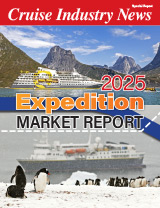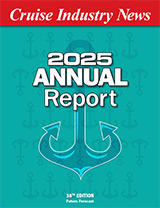 Addressing Caribbean islands, cruise destinations, tour operators and a variety of other delegates at the Florida-Caribbean Cruise Association (FCCA) Conference during a panel discussion, cruise industry leaders discussed a variety of topics, from fuel costs to the globalization of the industry.
Addressing Caribbean islands, cruise destinations, tour operators and a variety of other delegates at the Florida-Caribbean Cruise Association (FCCA) Conference during a panel discussion, cruise industry leaders discussed a variety of topics, from fuel costs to the globalization of the industry.
Chairman and CEO of Carnival Corporation, Micky Arison, noted the current challenges of fuel costs, commodity and food prices, as well as inflationary cost issues.
“But, on the flip side of that, it’s become a global business. Ten-fifteen-twenty years ago, it was U.S. and Caribbean centric,” he said. “Today, it is very much a global industry,” calling Australia the fastest growing market currently.
He added that Mediterranean itineraries on Holland American Line and Princess Cruises are now likely to have less than 50 percent American passengers.
Arison stressed that Carnival will continue to grow, however, at a careful rate.
Richard Fain, chairman and CEO, Royal Caribbean Cruises added: “It’s a fact of life that the growth will be slower, going for quality over quantity.”
Royal Caribbean has two newbuilds on the books for the Royal Caribbean International brand, one confirmed for TUI Cruises, with an option, and the last of five Solstice-class vessels, for Celebrity Cruises, to be delivered next year.
Commenting later in the discussion on the state of the economy, Fain said there are “liars, damned liars, and economists,” noting that he believes the cruise industry is sufficiently flexible to deal with what the issues are going forward.
One of those issues may be the upcoming North American Emissions Control Area (ECA), read a separate update on that by clicking here.
Global Competition
“I hope it’s becoming increasingly obvious that there is global competition that encompasses cruise markets,” said Adam Goldstein, president and CEO of Royal Caribbean International.
“All the research still shows people care about where they are going,” continued Goldstein, “if they have been to places in the past they want to know why they should return now.
“Today’s consumer has higher expectations. The bar has been raised for all of us,” he added, noting that the port down the road is not competition for Caribbean destinations, compared to Europe or China.
“The combination of the itinerary overall determines guest interest. It’s what the ports offer together that make it a go or no-go decision for the customer.”
Meanwhile, while Europe is a big market, Dan Hanrahan, president and CEO of Celebrity Cruises, was quick to point out that the Caribbean “is right up there with Europe” in terms of Celebrity’s capacity.
Fuel Costs
But while port infrastructure, marketing and offerings are more important than ever, fuel costs continue to play a key role.
Gerry Cahill, president and CEO of Carnival Cruise Lines, said that when he went to work for Carnival Corporation in 1994, fuel costs were 10 percent of what they are now.
“Fuel is now the big guerilla for where (we) decide to send a ship,” he said.
But, the buying decisions are still driven by paying passengers, so, “if they are willing to pay to go to ‘location B’ that is where the capacity is going to move,” Cahill stated.
For the first time ever, Carnival Cruise Lines will base a ship outside North America for a full year when it sends the Carnival Spirit to Australia in 2012.
Surveys
Cahill continued by saying that the ports and cruises lines “have to invest in the experience that we create for guests, that is the number one thing.”
He explained that if guests go on a cruise and have a great time, they are going to come back, and that same concept applies to destinations. “Nothing is more important than the ultimate guest experience,” he noted.
Interestingly, a cruise-passenger survey sent out by Carnival ranks ports, and “it rarely varies, but out of all the ports we visit in the Caribbean, three of the highest rated ones are the ones that Carnival Corp. has invested in.” Those include Grand Turk and Half Moon Cay.
“The little things count,” said Cahill. “Safety and security and an environment where the passenger is appreciated, that is a big deal.”
Rick Sasso, president and CEO of MSC Cruises USA, stressed that ports that have armed guards in army uniforms should “burn the clothes” and make armed personnel look like tourism ambassadors, “even if they are carrying a gun.”
Norwegian Cruise Line is busy planning winter 2013/2014, said Kevin Sheehan, CEO of Norwegian and chair of the FCCA, at a press conference.
“We spend months working on different itineraries, it’s a balancing act on the best financial return coupled with guest satisfaction at ports of calls,” he said.
Norwegian recently completed an almost $30 million upgrade to its private island, Great Stirrup Cay.



